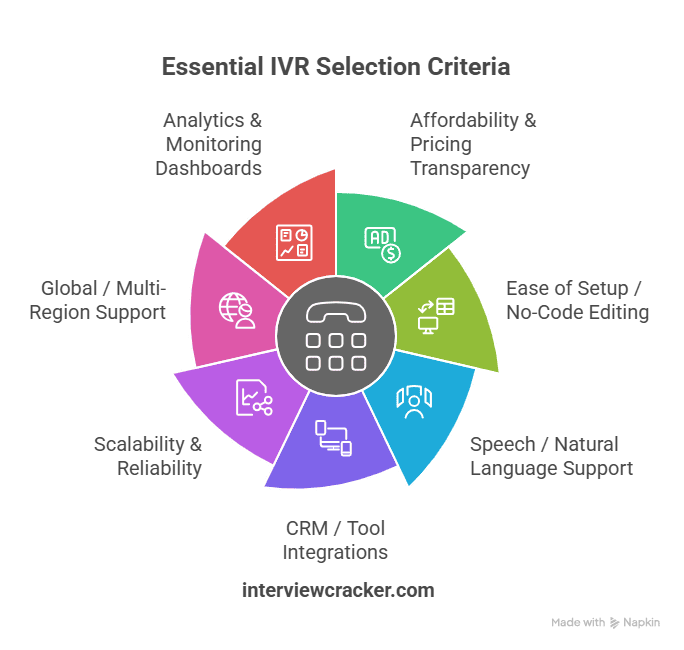In 2025–26, small businesses face growing pressure to deliver seamless customer service — and an IVR system for small businesses has evolved into a powerful tool to maintain responsiveness, reduce costs, and scale support. But which IVR systems are best suited for small businesses today? Below, we explore seven proven options that combine affordability, features, ease of use, and scalability.
Table of Contents
ToggleWhy Your Small Business Needs a Modern IVR
Before delving into options, let’s quickly review why IVR is no longer just a “big company” tool:
Handle call volume smartly: Even a modest number of inbound calls can overwhelm a small support desk. IVR helps by routing calls or enabling self-service paths.
Cost savings: Automating basic queries (e.g. “check status,” “billing”) cuts down on agent workload and reduces repetitive labor cost.
Professional image: A structured menu system and consistent greetings make a small team appear more polished.
24/7 accessibility: IVR can field after-hours or basic queries even when live agents aren’t available.
Integration & insight: Modern IVRs link to CRMs, ticketing systems, and provide analytics to improve workflows and decision-making.
These benefits hold even for smaller setups, especially when choosing a system designed for scalability, flexibility, and cost sensitivity.
Key Criteria for Selecting a Small Business IVR in 2025-26

Before you evaluate specific vendors, keep these criteria in mind:
Affordability & pricing transparency – Monthly or usage-based plans without hidden costs.
Ease of setup / no-code editing – Drag-and-drop flow editors or straightforward configurations.
Speech / natural language support – Ability to understand spoken input instead of relying solely on keypad input.
CRM / tool integrations – Seamless connectivity with your customer data, ticket systems, etc.
Scalability & reliability – Handle traffic spikes, high availability, backups.
Global / multi-region support – Local numbers, latency, regulatory compliance.
Analytics & monitoring dashboards – Real-time metrics, call logs, drop-off stats.
With that in mind, here are seven IVR systems that stand out for small business use.
1. Nextiva
Why it’s a top pick
Nextiva offers a well-rounded, all-in-one communications suite which includes IVR capabilities tailored for small and medium businesses. It combines ease-of-use, good support, and enough features to support growth.
You get call routing, auto attendant, and basic IVR in many of its packages.
It supports integration with CRMs, ticketing systems, and more.
It’s often rated as “best all-in-one call center IVR solution” in product roundups.
Considerations
The “premium” AI features may cost extra; evaluate whether you need advanced conversational flows or stick to simpler menus to start.
2. Aircall
Why it’s a good fit for small business
Aircall is frequently praised for its simplicity, usability, and cost-effective entry IVR options.
You can build IVR flows without coding, set up call queues and menus quickly.
Good for small teams that want to get up and running fast.
Supports integrations with CRMs and helpdesk tools.
Considerations
While solid for baseline scenarios, very advanced AI / natural language flows may be limited in the lower-tier plans.
3. CloudTalk
Why it stands out
CloudTalk offers features tailored to scaling support without complexity. It’s often included in “best IVR for small business” lists.
Supports inbound/outbound flows, queue routing, and multilingual menus.
Good analytics dashboard to track performance.
Flexible pricing that suits growing small businesses.
Considerations
Review latency and local call rates depending on your region. The more advanced features may require higher-tier plans.
4. Twilio (Programmable Voice / IVR APIs)
Why developers love it
Twilio is more technical, but offers unmatched flexibility. If your small business or team has developer resources, it allows you to build custom IVR flows, logic, and integrations.
Ideal when off-the-shelf IVRs are too rigid.
Enables orchestrating voice logic with CRM, databases, and external systems.
You pay for usage (minutes, logic execution), which can be efficient for smaller call volumes.
Considerations
Requires development effort; not ideal if you want a plug-and-play approach. Also, building and maintaining custom IVR flows can accumulate operational overhead.
5. 8×8
Why does it make the list
8×8 blends unified communications with IVR capabilities, making it easier for small teams to centralise their voice, chat, and meeting tools.
Offers multi-level auto-attendant, internal call routing, and team messaging.
Good value for an integrated communications stack.
Considerations
Its IVR features may not always match specialized IVR platforms — if your use case is heavy voice automation, check limits or add-ons.
6. Emitrr
Why it’s emerging
Emitrr markets itself as an AI-powered IVR system tailored for modern needs.
Emphasizes conversational voice flows, NLP, and wraparound analytics.
Good option if you want to experiment with AI on a smaller scale before scaling up.
Considerations
As a newer entrant, check maturity, support, and stability. For mission-critical functions, pair with fallback human routing.
7. OpenPhone
Why small teams like it
OpenPhone is often featured in small business IVR comparisons. It is lightweight, simple, and suited for businesses where voice is part of a broader communication strategy.
Efficient for teams that need basic IVR menus and call routing without heavy investment.
Good for setups where the bulk of communication is via messaging or email, with voice as backup.
Considerations
Not as robust for complex flows or high call volumes. Best for minimalistic IVR use cases.
Comparative Snapshot for IVR System for Small Businesses
| IVR System | Strength / Best Use Case | Trade-Offs / Cautions |
|---|
| Nextiva | Balanced, all-in-one, good support | Advanced AI features cost extra |
| Aircall | Easy setup, small team friendly | Limited in advanced conversational flows |
| CloudTalk | Scalable IVR + analytics | Check regional latency and rates |
| Twilio | Maximum flexibility, custom logic | Requires development resource |
| 8×8 | Integrated UC + IVR stack | IVR features less specialized |
| Emitrr | AI-forward IVR for modern usage | Emerging, check stability & fallback paths |
| OpenPhone | Simple, minimal, lightweight for small teams | Limited for complex IVR needs |

Tips to Get the Most Out of Your IVR
Start simple, iterate: Don’t begin with the most complex menu. Roll out basic flows, gather data, and refine.
Use fallback logic: Always allow callers to reach a human if the IVR fails to interpret.
Monitor drop-off points: Use analytics to see where callers exit or hang up — those are your pain zones.
Local number support: Ensure your provider offers local/national phone numbers in your target regions (for caller familiarity).
Test accents & speech patterns: Especially if your business serves varied linguistic groups.
Leverage integrations: Tie into your CRM, helpdesk, or analytics stack to enrich caller context and automate workflows.
Conclusion
For small businesses aiming to modernize customer support in 2025, the right IVR system can mean the difference between frustrated callers and smooth, efficient interaction.
If you want a balance between features and usability, Nextiva, Aircall, or CloudTalk are strong candidates. If you have development bandwidth, Twilio remains the gold standard in flexibility. For AI experimentation, Emitrr is an intriguing newer option. And for lightweight setups, OpenPhone or 8×8 may just hit the sweet spot.
FAQ (Voice-Search Friendly)
1. What is the best IVR system for a small business in 2025?
The best IVR system depends on your needs. Platforms like Nextiva, Aircall, CloudTalk, and Genesys Cloud are highly rated for small businesses due to their affordability, ease of use, and integration capabilities.
2. How much does a cloud IVR system cost per month?
Most providers offer subscription plans starting around $20–$50 per user/month. Options like Aircall and Nextiva have transparent pricing, while API-based platforms like Twilio use pay-as-you-go models.
3. Which IVR providers offer no-code drag-and-drop setup?
CloudTalk, Aircall, and Nextiva provide intuitive drag-and-drop IVR builders, making them great for businesses without technical teams.
4. How does IVR from Genesys, Aircall, and CloudTalk compare?
Genesys: Enterprise-grade with advanced AI and analytics.
Aircall: Cost-effective and easy to set up.
CloudTalk: Balanced features with scalable support for growth.
5. What features should a small business look for in IVR?
Key features include:
Multi-level call routing
Speech recognition
CRM integrations (Salesforce, HubSpot, Zoho)
24/7 self-service menus
Analytics dashboards
6. Can I integrate IVR with my CRM?
Yes — most modern IVR systems integrate seamlessly with CRMs like Salesforce, Zoho, HubSpot, or Dynamics. This allows customer context to flow automatically to agents.
7. Is AI / conversational IVR worth the extra cost?
Yes, if your call volumes are high. AI IVRs like Emitrr or Genesys Cloud CX can answer natural speech queries and reduce agent workload, improving ROI.
8. What is the ROI of switching from legacy phone systems to cloud IVR?
Small businesses typically see 30–40% cost reduction by cutting hardware, IT staff hours, and missed calls. Many also report higher customer satisfaction scores.
9. How reliable are IVR systems in 2025?
Providers like NICE CXone, Genesys, and Twilio guarantee 99.99% uptime via cloud redundancy and global data centers.
10. What happens if the IVR fails?
Most systems allow fallback rules — e.g., automatic transfer to a live agent or voicemail. Always check your provider’s failover support policies.
11. How easy is it to migrate to a new IVR provider?
Migration depends on your call flow complexity. Providers like Aircall and Nextiva offer guided onboarding, while Twilio allows fully custom migration via APIs.
12. Does cloud IVR support multiple languages and accents?
Yes — leading providers support multi-language menus and AI speech recognition. For example, Genesys Cloud offers multi-accent support across English, Spanish, and German.
13. Are there free or entry-level IVR systems?
Yes, some providers like Plum Voice and OpenPhone offer entry-level IVR or trial options, ideal for startups testing automation.
14. How do I choose between Twilio, Nextiva, and Aircall?
Twilio: Best for developers wanting custom control.
Nextiva: Great for all-in-one business communication.
Aircall: Perfect for small teams seeking simplicity.
15. What security and compliance standards should an IVR provider meet?
Look for GDPR, HIPAA, and SOC 2 compliance if handling sensitive data. Vendors like Genesys and NICE CXone meet these standards.





